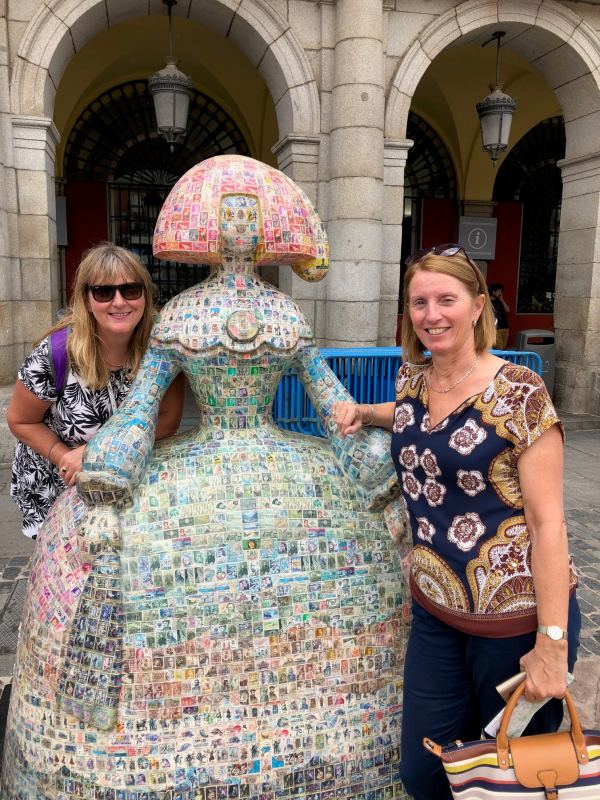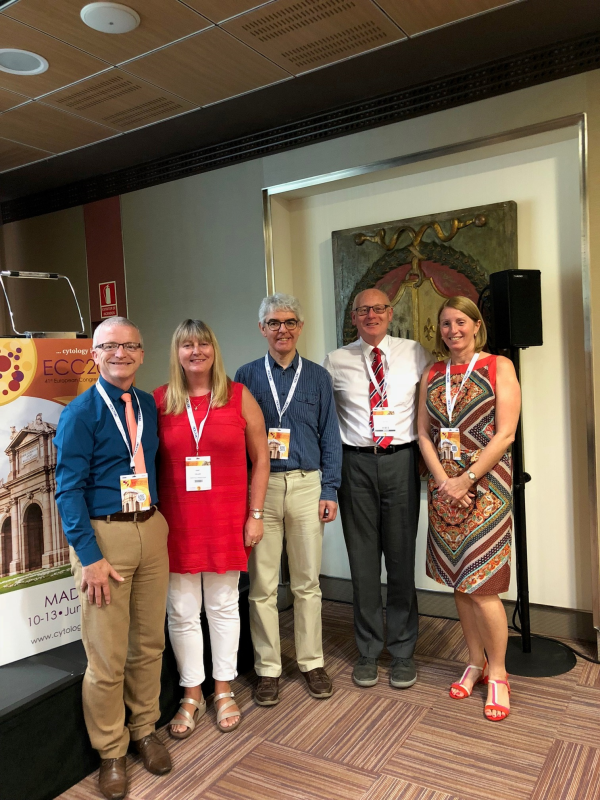What it means to be on the BAC executive
President of the BAC, Consultant Biomedical Scientist in cervical cytology Mrs Alison Cropper and Treasurer for the BAC, Consultant Biomedical Scientist Cervical Cytology
Later this year, several seats on the BAC executive committee will become available as the 3-year terms of office come to an end for nine existing executive members.
Not all nine will be standing for re-election and it is therefore vital that we have new nominations!
Without a full executive committee the BAC cannot function and serve our membership, so please consider standing for election and bring your cytology experience and expertise to the BAC! Have your say and influence the future of all aspects of the cytology profession.
We asked 2 long-standing committee members, Alison Cropper (current President) and Kay Ellis (current Treasurer) what being on the BAC executive entails and what it means to them:

From the left, Dr Kay Ellis and Alison Cropper representing the BAC in Madrid
Q. How does being on the executive committee impact on your working day and what time commitment is required?
AC. My employer is really supportive of the work I do for BAC and allows me the time to attend the executive meetings which are 3 or 4 times a year, mostly held now over Teams since the pandemic! I do use my own time for some BAC work, but it is not onerous, and I get such a lot out of feeling I have helped the voice of UK cytologists to be heard not just at home but abroad too. The BAC are highly regarded across the globe and it is great to be part of the executive team representing all our members. Being passionate about cytology I haven’t found it difficult to dedicate my time!
KE. Like Alison says it helps having the support of your Trust and they support me having time off work to attend meetings or to join through Teams. The Trust also supports my activities as it is beneficial for them to be recognised as supportive too. Just like everything in life, you manage your time accordingly and when you really care about what you do it certainly isn’t a hardship! It is a good feeling, having your say about cytology and helping to shape the future.
Q. Does being on the executive allow you to contribute in your areas of expertise and where you are most confident?
AC. It certainly does! I'm not involved in non-gynae cytology any longer, as are several other executive members, but I can bring my knowledge, experience, and expertise in cervical cytology to the table and am the BAC representative on a few national groups concerned with cervical screening. Equally, other executive members are involved with non-gynae groups and working parties, it's a really good mix.
KE. Absolutely! A problem, question or query never goes unanswered due to the vast experience and varying knowledge of the members of the Executive. I have learnt a lot from my colleagues and we have become good friends outside of work/BAC.
Being on the Executive has allowed my confidence to grow as you feel your view is valued and you are encouraged to share any expertise.
Q. What have been the most rewarding and most daunting challenges as an executive member?
AC. Having been on the executive BAC since it was formed, and the NAC council before that, my understanding of wider national issues has increased and I have grown in confidence which has enabled me to take on a range of roles within the executive. I have always felt supported and encouraged by the other executive members over the years and learned so much from all of them.
Being part of the organising committee for the European Cytology Congress which BAC hosted for the UK in Liverpool in 2016 was just amazing - the meeting was such a success and helped establish BAC as the 'go-to' cytology body in the UK.
On the flip side, BAC were involved in the implementation of primary HPV screening in England, simply as an advisory body, but a lot of members thought we were much more heavily involved in the decision making than we were, and we were bombarded with questions from members that we just didn’t have the answers for. This was frustrating for members and difficult to deal with and certainly a challenging time to have been on the executive!
KE. Like Alison, I was on the NAC Executive but also on the BSCC Council before they amalgamated to become the BAC as it is today. I’ve been on board for 25 years and wouldn’t have stayed so long if I didn’t enjoy it and feel I was contributing.
I would never have thought to join because I didn’t think I had anything to contribute but Eileen Hewer (RIP), Sue Strudwick (as was) and Nick Dudding suggested I should put myself forward and I have certainly had no regrets. I have gained confidence in speaking at conferences both nationally and internationally – something I never thought I’d be able to do. I have learnt so much and made amazing friends. It’s given me the opportunity to travel representing the BAC at international meetings and meeting really interesting people in the world of cytology. I hope I have been able to contribute something.
I really enjoy being part of the organising committee and looking at the social side of the events. The highlight was definitely the ECC2016 in Liverpool where we had ‘Unbelievable Magic’ and the Mersey Beatles. Who can forget the great and good of the international cytology world with their air guitars and John Lennon wigs!
Q. What advice would you give for BAC members who may be interested in being nominated for the executive?
AC. Go for it! Whatever your area of interest or practice, and whatever your level of experience, the BAC needs input from members on to the executive. You will learn so much and over time be able to contribute to a wide range of issues and sub-committee work, and you will be fully supported by the other executive members. Please don’t think that you need to be in a senior role to be nominated, you definitely don’t - a good balance of all levels is what the BAC needs to thrive and survive.
KE. You decide your pace and what you want to contribute. The Executive are so supportive and really do encourage you. Sometimes it is hard work and can be very frustrating, but it is also very rewarding and lots of fun. Give it a go – we all have something to contribute.
If you would like any further information from Alison and Kay or any of the executive team then please get in touch using the link below. We'd be more than happy to hear from you.
BAC Executive nomination form
Can you help lead the BAC by joining the Executive?
There are nine seats available on the BAC Executive at the AGM 2023 on Wednesday 15th November 2023 12pm to 1.30pm.
The Executive is bound by the aims and objectives of the BAC constitution and is responsible for setting the strategic direction of the Association.
Who can stand as Executive members?
The individual will need to be a BAC member and be nominated by another member of the BAC.
You will require diplomacy and the ability to fully understand BAC policy and discuss confidential issues with a broad outlook of the profession.
Time commitments
As an Executive committee member, you will need to attend a minimum of 3 committee meetings per annum, with the Executive currently meeting both in-person and via video conferencing. You will be expected to join one of the sub-committees or working groups in areas such as education, events planning, diagnostic cytology, and research & development.
There is no payment for work undertaken as a member of the Executive although reasonable expenses are reimbursed.
A vote will be required if there are more than nine nominations. All nominations will require approval at the AGM.
The nomination form is downloadable and should be returned by email to the BAC officer by no later than 31st July 2023


